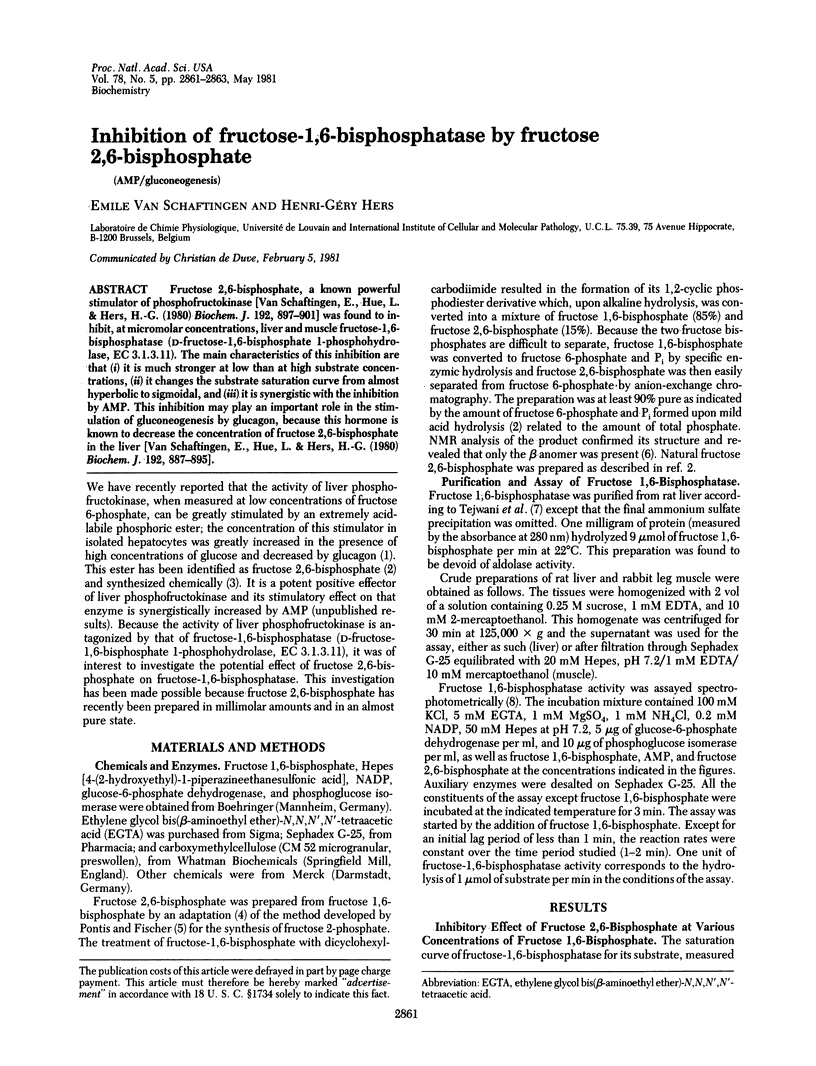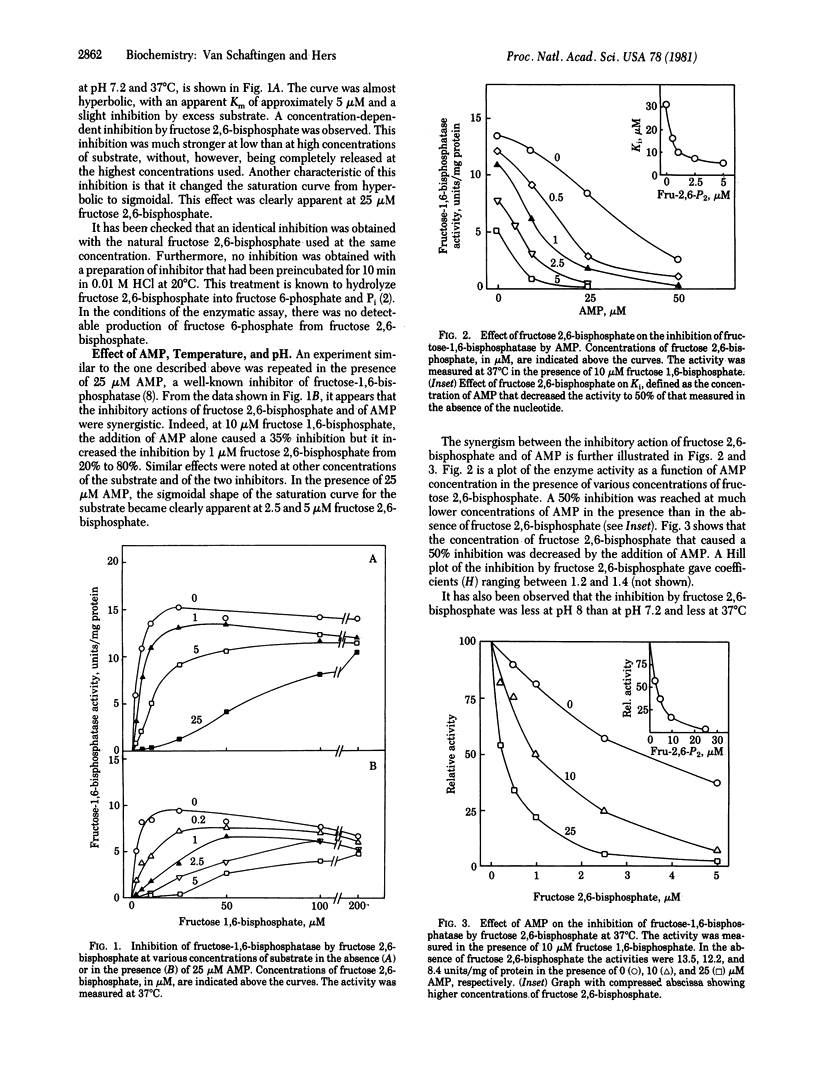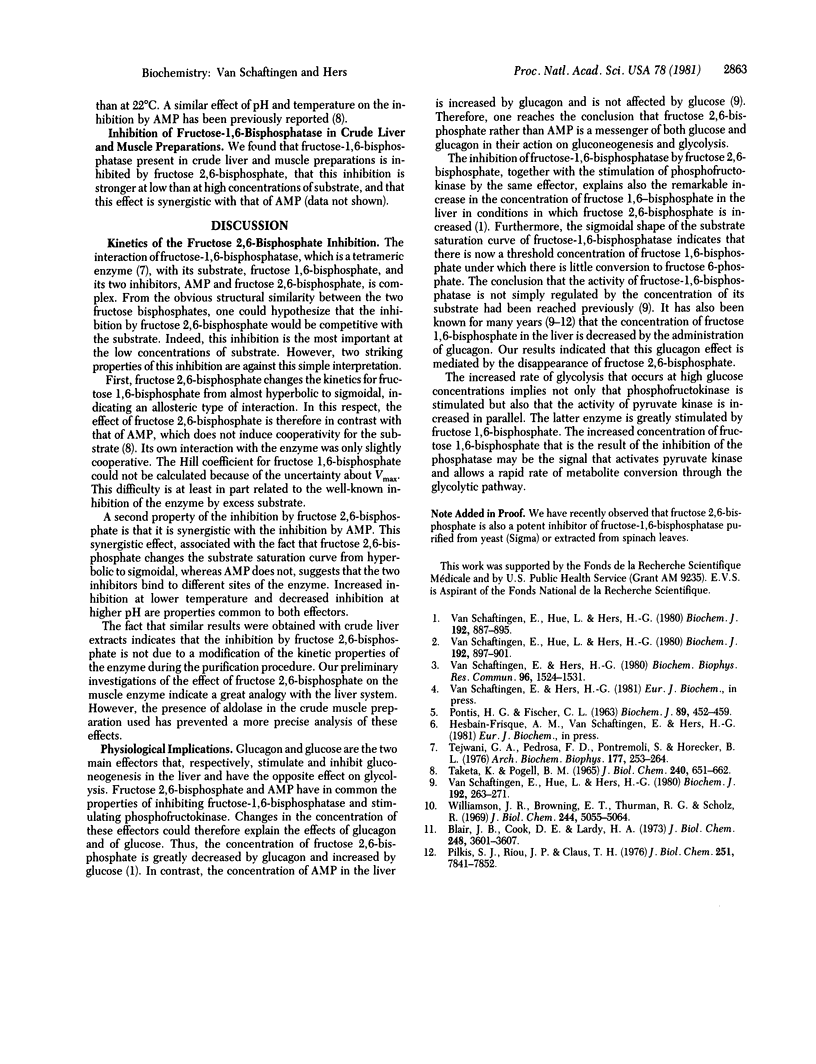Abstract
Fructose 2,6-bisphosphate, a known powerful stimulator of phosphofructokinase [Van Schaftingen, E., Hue, L. & Hers, H.-G. (1980) Biochem. J. 192, 897-901] was found to inhibit, at micromolar concentrations, liver and muscle fructose-1,6-biphosphate (D-fructose-1,6-bisphosphate 1-phosphohydrolase, EC 3.1.3.11). The main characteristics of this inhibition are that (i) it is much stronger at low than at high substrate concentrations, (ii) it changes the substrate saturation curve from almost hyperbolic to sigmoidal, and (iii) it is synergistic with the inhibition by AMP. This inhibition may play an important role in the stimulation of gluconeogenesis by glucagon, because this hormone is known to decrease the concentration of fructose 2,6-bisphosphate in the liver [Van Schaftingen, E., Hue, L. & Hers, H.-G. (1980) Biochem. J. 192, 887-895].
Full text
PDF


Selected References
These references are in PubMed. This may not be the complete list of references from this article.
- Blair J. B., Cook D. E., Lardy H. A. Influence of glucagon on the metabolism of xylitol and dihydroxyacetone in the isolated perfused rat liver. J Biol Chem. 1973 May 25;248(10):3601–3607. [PubMed] [Google Scholar]
- PONTIS H. G., FISCHER C. L. SYNTHESIS OF D-FRUCTOPYRANOSE 2-PHOSPHATE AND D-FRUCTOFURANOSE 2-PHOSPHATE. Biochem J. 1963 Dec;89:452–459. doi: 10.1042/bj0890452. [DOI] [PMC free article] [PubMed] [Google Scholar]
- Pilkis S. J., Riou J. P., Claus T. H. Hormonal control of [14C]glucose synthesis from [U-14C]dihydroxyacetone and glycerol in isolated rat hepatocytes. J Biol Chem. 1976 Dec 25;251(24):7841–7852. [PubMed] [Google Scholar]
- TAKETA K., POGELL B. M. ALLOSTERIC INHIBITION OF RAT LIVER FRUCTOSE 1,6-DIPHOSPHATASE BY ADENOSINE 5'-MONOPHOSPHATE. J Biol Chem. 1965 Feb;240:651–662. [PubMed] [Google Scholar]
- Tejwani G. A., Pedrosa F. O., Pontremoli S., Horecker B. L. The purification of properties of rat liver fructose 1,6-bisphosphatase. Arch Biochem Biophys. 1976 Nov;177(1):253–264. doi: 10.1016/0003-9861(76)90435-5. [DOI] [PubMed] [Google Scholar]
- Van Schaftingen E., Hers H. G. Synthesis of a stimulator of phosphofructokinase, most likely fructose 2,6-bisphosphate, from phosphoric acid and fructose 6-phosphoric acid. Biochem Biophys Res Commun. 1980 Oct 31;96(4):1524–1531. doi: 10.1016/0006-291x(80)91347-9. [DOI] [PubMed] [Google Scholar]
- Van Schaftingen E., Hue L., Hers H. G. Control of the fructose-6-phosphate/fructose 1,6-bisphosphate cycle in isolated hepatocytes by glucose and glucagon. Role of a low-molecular-weight stimulator of phosphofructokinase. Biochem J. 1980 Dec 15;192(3):887–895. doi: 10.1042/bj1920887. [DOI] [PMC free article] [PubMed] [Google Scholar]
- Van Schaftingen E., Hue L., Hers H. G. Fructose 2,6-bisphosphate, the probably structure of the glucose- and glucagon-sensitive stimulator of phosphofructokinase. Biochem J. 1980 Dec 15;192(3):897–901. doi: 10.1042/bj1920897. [DOI] [PMC free article] [PubMed] [Google Scholar]
- Van Schaftingen E., Hue L., Hers H. G. Study of the fructose 6-phosphate/fructose 1,6-bi-phosphate cycle in the liver in vivo. Biochem J. 1980 Oct 15;192(1):263–271. doi: 10.1042/bj1920263. [DOI] [PMC free article] [PubMed] [Google Scholar]
- Williamson J. R., Browning E. T., Thurman R. G., Scholz R. Inhibition of glucagon effects in perfused rat liver by (+)decanoylcarnitine. J Biol Chem. 1969 Sep 25;244(18):5055–5064. [PubMed] [Google Scholar]


